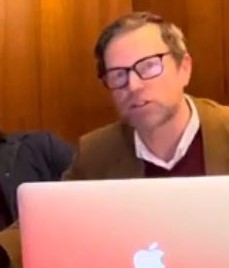Backgrounder: Exclusive Brethren Lobby MP's
On Unions

See also - Peter Dunne's Relationship With The Exclusive Brethren
The Exclusive Brethren do not normally appear in the news. However, last week their attempts to influence this year's general election in favour of the National Party received a great deal of coverage. Whilst the Exclusive Brethren have historically shied away from politics, they have previously been involved in lobbying politicians regarding certain legislation which they consider affects their lives.
Last year the Exclusive Brethren actively lobbied politicians on the Employment Relations Law Reform Bill and the Civil Union Bill. Exclusive Brethren members Andy Smith, Ron Hicknott and Timothy Lough were involved in preparing written submissions seeking exemptions for their businesses on the grounds of conscience.
Mr Lough and Mr Smith were two of the seven backers of the expensive pamphlet drops seeking to derail Labour and the Greens campaigns – and change the Government to a National led administration.
The Exclusive Brethren were assisted in their campaign to exempt themselves from employment law by United Future's leader Peter Dunne. Mr Lough told Scoop on Friday that he lobbied Mr Dunne as he was his Local MP (Ohariu Belmont).
"There is a very strong Exclusive Brethren community in my electorate – they came to see me and lobbied me on [conscientious objection from unions]. I thought that made perfect sense. I've supported amendments in that regard over the years. That was the last time I spoke to them," explained Mr Dunne to Scoop on Friday.
A paper, attached to the Exclusive Brethren's written submission on the Employment Relations Law Reform Bill, was written by a Mr Bryan Wilson of Oxford University. In this paper Mr Wilson explains the Exclusive Brethren's dislike of unions.
"The Brethren believe that the bible does not recognize any union intervention between employer and employee ( described there as master and servant)," wrote Mr Wilson.
Mr Dunne's lobbying was ultimately unsuccessful due to the Green Party siding with Labour, the Progressives and the Maori Party. However the Exclusive Brethren were able to lobby well enough to have enlisted the support of United Future's Peter Dunne, NZ First's Peter Brown and National's Dr Lockwood Smith to their cause.
Also, whilst Mr Dunne highlighted the Exclusive Brethren's connection with education in his speech to the House, it is quite clear from the Exclusive Brethren's written submissions that they are seeking exemptions regarding some of their larger businesses from employment law.
"It has also been brought to our attention by senior staff senior staff of the Department of Labour that some 60 brethren businesses have a company structure and therefore have no protection under [the] present law," explains the Exclusive Brethren's submission.
Edited Speeches By Hon Peter Dunne (UF), Peter Brown (NZ First) and Dr Lockwood Smith (National) on behalf of the Exclusive Brethren 12 October 2004
I want to speak to Supplementary Order Paper 276, which stands in my name and which inserts new clause 9A, “Issue of certificate of exemption”. The Committee will be aware that sections 23 and 24 of the principal Act deal with the issue of union access to workplace sites being denied on grounds of conscience, particularly on religious grounds, provided that certain certificates of exemption are in place. The amendment I am proposing by way of this Supplementary Order Paper clarifies that provision in respect of members of the Brethren Church in so far as their educational and business organisations are concerned.
What the amendment does is to carry through a principle that has been long recognised in industrial relations law, from the time of the Labour Relations Act of the late 1980s right through the Employment Contracts Act days and through to the Employment Relations Act, regarding the right of conscientious objection. The amendment simply deals with the situation that now occurs as a result of moves by, in this case, members of the Brethren Church into the education field.
The amendment very particularly circumscribes the group to whom it applies. I want to quote from the amendment, and I will explain it a little further in a moment.
The operative part of the amendment is that individuals, trustees, or directors are being exempted where an individual is a practising member, or all the trustees of the registered trust concerned are practising members, or all the directors and shareholders of a private company are practising members, of a religious society or order whose doctrines or beliefs preclude membership of any organisation or body other than the religious society or order of which the employer is a member.
There is only one group in that category in New Zealand. It is a group that has long been respected in industrial relations law, and it is the Brethren Church. Its members, some of whom are here in the gallery this evening to support this amendment, have long had an assurance from successive Governments that their rights of conscientious objection, given their particular beliefs, would be respected.
The reality is that unless this amendment is passed we will be removing, in particular in respect of education but also in respect of some of the business operations the Brethren Church is involved in, a significant portion of that right of individual conscientious exemption on religious grounds. That is a backward step, and it cuts right across assurances that the Minister, the Prime Minister, and others have given from time to time that those rights will be upheld. Whatever one’s view about the particular organisation, that is not the point.
The reality is that a long-held principle of industrial relations law is being tampered with and is going to be put in a position whereby those individual matters of conscience will now have to be dealt with in a different way. That will create hardship for that organisation—in particular, in respect of its educational activities.
The Brethren Church is now involved in establishing schools up and down the country, where it employs teachers who meet all the standard registration procedures, and those schools meet New Zealand Qualifications Authority standards and other standards, etc.
Those operations, which I understand educate around about a thousand children, will be put under some risk as a result of this bill being passed without this amendment being adopted.
So I say to the Committee and to the Minister that if this amendment fails, then what we are doing is sending a signal that the industrial relations law is being changed in a way that is not only detrimental but is also discriminatory.
Later in the debate Mr Dunne received support from national's Dr Lockwood Smith for his amendment on behalf of the brethren and NZ First's Peter Brown
I would like to acknowledge the contribution made by the member who has just resumed his seat, and to tell him that New Zealand First will be supporting Supplementary Order Paper No 276 in his name. The Brethren Church has been in touch with us. I know that several of my colleagues have been spoken to, and when the Hon Peter Dunne sent me his amendment we received it with pleasure and are only too pleased to support it.
As there are members of the Exclusive Brethren here in the gallery tonight, I want to make it clear that National, likewise, respects their conscientious objection to some of the provisions in this legislation and will also support the amendment to provide for that deeply held belief.
ENDS



 Richard S. Ehrlich: Deadly Border Feud Between Thailand & Cambodia
Richard S. Ehrlich: Deadly Border Feud Between Thailand & Cambodia Gordon Campbell: On Free Speech And Anti-Semitism
Gordon Campbell: On Free Speech And Anti-Semitism Ian Powell: The Disgrace Of The Hospice Care Funding Scandal
Ian Powell: The Disgrace Of The Hospice Care Funding Scandal Binoy Kampmark: Catching Israel Out - Gaza And The Madleen “Selfie” Protest
Binoy Kampmark: Catching Israel Out - Gaza And The Madleen “Selfie” Protest Ramzy Baroud: Gaza's 'Humanitarian' Façade - A Deceptive Ploy Unravels
Ramzy Baroud: Gaza's 'Humanitarian' Façade - A Deceptive Ploy Unravels Keith Rankin: Remembering New Zealand's Missing Tragedy
Keith Rankin: Remembering New Zealand's Missing Tragedy